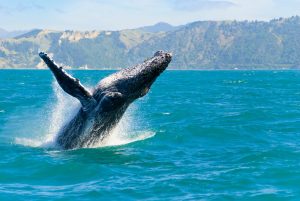New Zealand and other Commonwealth nations wrapped up their global meeting in Samoa last week with a declaration to protect the ocean in the face of severe climate change, pollution and over-exploitation.
The Apia Commonwealth Ocean Declaration builds on the 2018 Commonwealth Blue Charter and commits members to “robust and ambitious, innovative and transformative action for our ocean towards a true ‘common wealth’ of shared prosperity, resilience and sustainability.”
New Zealand often demonstrates international leadership in relation to oceans issues. But this cannot be based on statements and declarations alone. International commitments must be backed up by domestic oceans policy – and that’s where New Zealand is no longer a leader.
Climate change is largely absent from New Zealand’s domestic ocean management processes. This is demonstrated by the government’s proposal to resume oil and gas licensing offshore. This proposal has been criticized by Pacific island states and, indirectly, by the United Nations Secretary General.
New Zealand’s track record in domestic marine protection is also woeful. Only about 2 percent of the country’s waters are fully protected, well below the global average. Reform of marine protected areas has been attempted and abandoned several times over the past decade, with little appetite at present to address this issue.
More than half of the 56 Commonwealth nations are small island developing states that depend on the oceans for economic and cultural needs. They are also particularly vulnerable to climate change and sea-level rise.
The Apia Declaration recognizes the “global emergency” facing the oceans and reiterates existing global commitments to protect them. These include limiting temperature rise to 2 degrees Celsius (preferably 1.5 degrees) and taking action to address plastic pollution and unsustainable fishing, and to protect and restore ocean ecosystems.
The declaration also recognizes the importance of the blue economy. It places particular emphasis on the potential for marine renewable energy to support a “just and equitable sustainable energy transition” and encourages support for increased investment in renewable energy sources, including wave, tidal, ocean thermal, wind, floating solar, green hydrogen, and marine biomass.
The Apia Declaration is of importance to the Pacific and to New Zealand, a Commonwealth member, for three reasons.
1. Protecting Maritime Zones in the Face of Sea-Level Rise
The declaration recognizes the fundamental rights and interests of all states and peoples of the Commonwealth in the oceans. It affirms that members can maintain their current maritime zones, notwithstanding sea-level rise.
This is significant from the perspective of the United Nations Convention on the Law of the Sea (UNCLOS). Under the law of the sea, maritime zones are drawn from base points such as, for example, the low-water line along the coast.
Traditionally, if the base point disappears through physical processes, the view of most states has been that baselines need to be redrawn to reflect the new physical landscape. This would mean that as sea levels rise and base points are lost, the baseline moves toward the coast and maritime zones may be reduced.
By contrast, Pacific island states have, since around 2015, consistently asserted that they are entitled under international law to “fix” their maritime zones at a particular point in time and maintain them in the future, irrespective of sea-level rise. New Zealand has supported this position.
Importantly, the Apia Declaration demonstrates broader support for this position from states outside the Pacific, including the United Kingdom, and confirms that any Commonwealth state is similarly entitled.
The declaration represents an important example of what international lawyers describe as “state practice.” The 56 Commonwealth states are taking a position on an interpretation of international law that supports the rights of vulnerable states to fix their maritime zones at a particular point in time in order to protect their ocean rights, including exclusive control over fish and minerals, from being eroded as sea levels rise.
2. Preventing Pollution
The declaration encourages all Commonwealth members to take action to prevent pollution of the marine environment, including carbon emissions.
It endorses the conclusions reached by the International Tribunal for the Law of the Sea (ITLOS) in May this year in its climate change advisory opinion. This states that nations are under a due diligence obligation to protect and preserve the marine environment from the impacts of climate change.
It also encourages states to integrate and strengthen ocean-based action in their climate pledges (known as Nationally Determined Contributions) under the Paris Agreement.
Further, the declaration calls on nations to protect and restore blue-carbon ecosystems such as mangroves and salt marshes that can play an important role in the sequestration of carbon dioxide.
3. Ocean Protection
The declaration affirms the global commitment to protect 30 percent of the marine environment by 2030. It urges the restoration of 30 percent of degraded coastal and ocean ecosystems in order to enhance ecosystem function, connectivity and integrity.
It also calls for integrated coastal management and emphasizes the importance of inclusive participation in ocean governance by Indigenous Peoples and the public.
New Zealand has signed up to significant climate commitments in the Apia Declaration, but these are not reflected in domestic policy.
Regional leadership does not happen through declarations alone, nor through financial support for initiatives such as the Pacific Resilience Facility, to which New Zealand pledged a NZ$20 million contribution.
Important as these international commitments are, leadership must also be demonstrated by action at home.
This article was originally published on The Conversation. Read the original article.
![]()

































